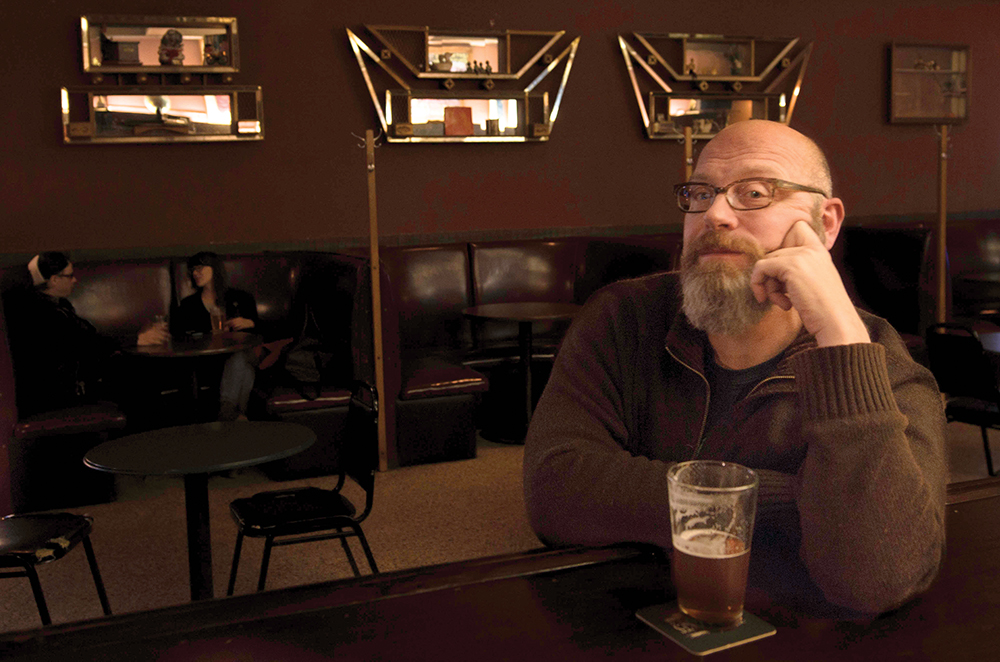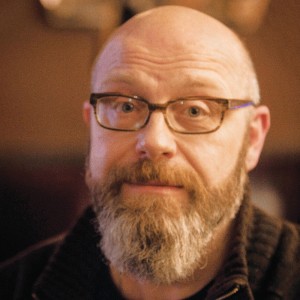
A story of stories, John Hospodka’s “South Side Trilogy” is the narrative of a neighborhood that is at once real and out of this world. Told through art, video, poetry, prose, voice recordings, and song, the multimedia work follows the lives of a few residents of Hardscrabble, Chicago, a fictional neighborhood based on Bridgeport. Though it was begun in 1995, the three parts of the trilogy weren’t finished and collected until 2010; since 2013, it has been available for download as an e-book. Still, the work is less a book than what Hospodka calls a “literary picture show.” At its opening, Hospodka monologues before breaking into a deep song, singing his fictionalized neighborhood’s bluesy theme.
Hospodka has a heavy beard, and the intensity of his eyes is magnified by his glasses. He looks like he’d be more at home on a bar stool than at the spindly-legged tables of Bridgeport Coffeehouse, where we meet. His voice in conversation is recognizable from the trilogy as he talks about M.F.A. programs, Hardscrabble, and Bernice’s.
What is your background? Where are you from?
I’m a Chicagoan. I went for four years to school at Ohio Wesleyan and came right back to Chicago. I’ve been an aspiring writer since as long as I can remember, and I’ve always based my life on that, meaning that I have stayed as far away from careers as possible. I’ve had a job right now for eight years or so working with a construction consultancy. It’s my livelihood but I don’t consider it my life; I don’t take it home with me, I don’t talk about it. I talk about writing. I’ve always considered myself a writer. And that’s basically it. I’m a Chicagoan.
And you never got sidetracked into having a career?
No.
Your story incorporates video, song, poetry, and collaborations with local artists. Had you done anything like that before?
No, I hadn’t. I think it all comes from having a theater background. All of my friends have been in theater in one way or another or have worked in film in one way or the other, and I’ve always longed for that collaborative community to work with. As a writer you get stuck in a basement sometimes by yourself when your only audience is your dog. It’s a lonely craft, writing. And so I always thought I’d like to make it a more communal experience for myself. It’s been kind of a selfish thing, wanting to project my writing onto others and to bring them into my little realm of loneliness.
But there’s also a reasoning behind it, and that’s because I was an aspiring poet—talk about lowest rung on the hierarchy as far as literature goes, as far as acknowledgement goes from a reading public. Essentially poetry is read by poets.
Being a poet and wanting poetry to be read, I was trying to come up with a new context for poetry where poetry wasn’t the main focus but was a main ingredient.
It’s like a mother slipping broccoli into a dish.
Exactly. I hope that it opens the eyes of poets and readers. It’s really hard to do when you’re self-publishing and you’ve got no one behind you. But I really think this whole South Side poetry isn’t about me. It’s more for the art of poetry. I think that the public is actually willing to read poetry if it’s given to them on their terms instead of being asked to come to poetry on poetry’s terms. I think a lot of poetry today is very academic, is very insular, so it doesn’t invite a public in. I think there’s a readership for poetry out there, it just needs to be finagled.
You wrote in “South Side Trilogy” that “Chicago’s written word turns its back on university towers.” I definitely got that sense that you’re fighting against writing that has been co-opted by the academy. So how do you feel that should be subverted?

I think that what has happened today is because of M.F.A. programs. Writing has become looked at as a feasible career and—I’m speaking very romantically—I don’t think of art as being a career in any way. Art is too impractical to be put into a practical realm such as one where you’re trained for a career as a poet. I think that you can go through undergrad, be taught very well with workshops by very good instructors, be tossed out into the world, and if you got what it takes and if you’ve really got the passion for it you’re gonna stay with it. I kind of think M.F.A.s are a scam.
If you consider yourself a writer and you want to be published and recognized as a writer I think you should go for an M.F.A., because if you don’t you are an outsider and you better have patience, because it’s gonna take a long time to get recognized when you’re not in that group. But I think that that approach, coming from the outside in, it’s more fun. You have nothing to lose. You can be more daring, you can take risks. You can actually live life for six months without thinking about a poem and not feel like you’re wasting time.
But the tradeoff of course is that you’re losing a potentially much larger audience.
It’s a huge tradeoff. You’re sacrificing your dreams and are actually making it less feasible if you don’t play by the rules. I know many people who are in those programs and they swear by them, and swear they made the right decision. And if you look at their publishing credits, they probably did. I don’t want to come off like I’m anti-M.F.A.—I am anti-M.F.A., but I understand why they exist and I’m certainly not one to judge anybody. I can judge the programs but I don’t judge the people.
“South Side Trilogy” is very much about Chicago; there are times when you specifically choose metaphors that would only make sense to someone in Chicago, someone who knows these neighborhoods well. Do you feel you limit yourself that way or that you get extra power by sticking to these local voices?
That’s a good question. When I started writing “South Side Trilogy” it was going to be specifically about Bridgeport. Book One, which is called “Greetings from Hardscrabble, Chicago,” was going to be called “Greetings from Bridgeport, Chicago.” The whole book was going to be very specific to Bridgeport. And when I started writing, that absolutely limited me and also limited what I was really trying to get at. So I did start to make up the names of streets while keeping the names of bus routes accurate. I wanted the book to have its hand in both metaphor and reality.
I wanted to turn the neighborhood into not exactly a physical neighborhood but also a mental neighborhood, a sort of a purgatory, something otherworldly. Chicago as a theme for me has more to offer than its reality. I think there’s an otherworldliness to Chicago that I always want to bring out.
What’s otherworldly about Chicago?
When you see the characters in Hardscrabble they’re all kind of beaten. They’re drinkers, they’re drug users, they’re beaten by reality. And then there’s this other sense to them. There’s this longing to be cultured. They all read, they all dabble in music, they dabble in arts. They’re not exactly in the gutter but they’re in a tough neighborhood living in tough circumstances and they have that sort of tough background to them. There’s that longing for beauty, for culture, that they touch on and almost know they could accomplish but they never quite accomplish.
There’s something that hovers about Chicago that makes one want to appreciate beauty and culture and I think that you find that in a lot of folks. That’s one thing that I discovered moving down to Bridgeport and being an aspiring writer, moving into essentially the quintessential blue-collared neighborhood in Chicago. Everyone I’d meet in bars I always thought were these tough dudes, but then one fellow played piano for me once and it was like he was a classical pianist, but you never would have guessed it. He was just some guy from Bridgeport who had this desire to capture a little bit of beauty. It was like the quest for culture was automatic to these folks, they didn’t even question it.
This work includes many different voices. Whose voices are these? Are these your friends, are these people you know at bars? Are these people you’ve watched, or just heard about?
There are no friends, no friends in there. Mostly just people I’ve encountered hanging out in bars, hanging out in coffee houses just trying to capture the rhythm of how people speak and how they think. Yeah, it’s a myriad of voices from the neighborhood and from the South Side.
So in the actual process of creating all these stories, did this end up being more about a communal effort with your friends, or was it you writing in a basement and then bringing pieces to them?
It was the latter. Once I brought them the monologues I let them record it on their own. And I’m really happy about that. Had I been hovering over them I might have been inclined to give them that Chicago voice. That’s where it’s not necessarily Chicago, that’s where it’s otherworldly; handing over trust to folks that I know and just telling them go for it. It was collaborative but the writing was all mine. But the final product we teamed up with that.
I noticed two themes: the reading and the drinking. How much is that a part of your life, and how much is that a part of the “lost dream,” Bruce Springsteen kind of thing?
It’s definitely Bruce Springsteen. I don’t know if it’s so much lost dream. It’s just pure nature and habit. I’m a barfly. I’m married but I don’t have any kids and it’s the way of life that we’ve chosen to live by and that’s where we find our friends.
You gotta face it: me and a lot of my friends, we’re just old burnouts hanging out, trying to keep things real as far as our parts go, whether writer or actor. Trying to keep youthful. Maybe we all have drinking problems, but I don’t think that’s the case.
What’s your favorite bar?
The Skylark in Pilsen. I think they should put a plaque where I sit, because if anyone working there has children I’m definitely putting them through college. It’s a great place; it’s where our friends hang out; it’s our gathering place. It’s at 22nd and Halsted. My favorite place in Bridgeport specifically is Bernice’s.
Are you an artist first, or are you a Chicagoan first?
Love that question. I think I’m a Chicagoan first because you can’t help but be influenced by your surroundings, especially if you’ve been in those surroundings your whole life. So I’m more of a White Sox fan than I am a Nelson Algren fan.
I don’t know if I’ll ever again specifically write a book about Chicago, but Chicago will always be present. It’s the place I know where people eat, where people sleep, where people drink, where people get into car accidents. It’s my reality.
